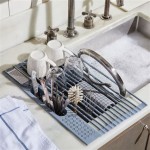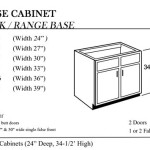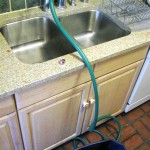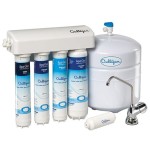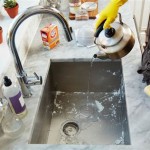Sink Making A Gurgling Noise: Understanding the Causes and Solutions
A gurgling sound emanating from a sink drain is a common household plumbing issue. While often dismissed as a minor inconvenience, it frequently indicates a more significant underlying problem within the drainage system. Understanding the potential causes of this gurgling noise is crucial for effective diagnosis and appropriate remediation. Addressing the issue promptly can prevent escalating problems and potential costly repairs. This article will delve into the common reasons behind sink gurgling, focusing on the underlying mechanisms and practical solutions to restore normal drain function.
Negative Air Pressure and Venting Issues
One of the primary causes of a gurgling sink is negative air pressure within the drain pipes. Plumbing systems are designed with vent stacks that extend upwards from the drain lines, typically through the roof. These vents allow air to enter the pipes, maintaining neutral air pressure and facilitating smooth water flow. Without proper venting, a vacuum can form as water flows down the drain. This negative pressure pulls air from the closest available source, which can be another drain, such as a sink, toilet, or shower. The gurgling sound is the result of air being sucked back up through the water in the sink's P-trap.
The vent system works by equalizing the pressure in the drain pipes with the atmospheric pressure. When water rushes down the drain, it pushes air ahead of it. If the vent is blocked, this air has nowhere to go, creating a pressure differential. This pressure difference can then cause the water in the P-trap of the sink to be siphoned out, leading to the gurgling sound as air enters to equalize the pressure. The P-trap is a U-shaped pipe located under the sink; it is designed to hold water, creating a seal that prevents sewer gases from entering the home. When the water is siphoned out, that seal is broken, and sewer gases can enter.
Several factors can contribute to vent blockage. One common cause is debris accumulation, such as leaves, twigs, or bird nests, obstructing the vent opening on the roof. These obstructions restrict airflow and disrupt the pressure equalization process. Another potential cause is improper venting installation. If the vent pipes are not correctly sized or positioned, they may not effectively vent the system, leading to negative pressure problems. Furthermore, freezing temperatures can cause ice to form inside the vent pipes, particularly in colder climates, completely blocking the vent and causing significant gurgling issues.
Addressing venting problems typically involves inspecting the vent stacks for obstructions. This may require accessing the roof to visually examine the vent openings. If debris is present, it should be carefully removed. A garden hose can be used to flush out any remaining debris. If ice blockage is suspected, pouring hot water down the vent stack may melt the ice and restore airflow. In cases of improper vent installation, consulting a qualified plumber is necessary to assess the venting system and make the required modifications.
Partial Drain Blockages and Slow Draining
Another common cause of sink gurgling is a partial blockage within the drain line. A partial blockage restricts the flow of water, creating backpressure and turbulence that can manifest as a gurgling sound. This blockage can occur anywhere along the drain line, from the sink's tailpiece to the main sewer line connection. Common culprits include hair, grease, food scraps, soap scum, and mineral deposits. Over time, these materials accumulate and gradually narrow the drainpipe, hindering water flow.
The symptoms of a partial drain blockage often include slow draining, gurgling noises, and sometimes unpleasant odors emanating from the drain. The slow draining is a direct result of the reduced diameter of the drainpipe due to the accumulated debris. The gurgling noise arises from the water struggling to pass through the restricted area, creating air pockets and turbulence. The odors can occur as trapped organic matter decomposes within the blockage, releasing foul-smelling gases.
Several methods can be employed to address partial drain blockages. A plunger is a common and effective tool for dislodging minor blockages near the sink drain. The plunging action creates pressure and suction that can loosen debris and allow it to be flushed down the drain. A drain snake, also known as an auger, is another useful tool for clearing more stubborn blockages. Drain snakes are flexible metal cables that can be inserted into the drainpipe to break up or retrieve the obstructing material. Chemical drain cleaners are also available, but they should be used with caution, as they can be corrosive and potentially damage pipes, especially older plumbing systems. These chemicals often contain harsh ingredients that can dissolve organic matter but may also damage the integrity of the pipes over time.
For more severe or persistent blockages, it may be necessary to disassemble the drainpipe under the sink to physically remove the obstruction. This involves disconnecting the P-trap and other drain components and cleaning them thoroughly. Prevention is key to minimizing drain blockages. Avoiding pouring grease down the drain, using strainers to catch hair and food scraps, and periodically flushing the drain with hot water can help prevent buildup and maintain proper drain flow.
Problems with the Main Sewer Line
In some cases, a gurgling sink can indicate a problem with the main sewer line, which is the primary drainpipe that carries wastewater from the house to the municipal sewer system or septic tank. A blockage or malfunction in the main sewer line can affect the drainage of all fixtures in the house, including sinks, toilets, showers, and washing machines. Symptoms of a main sewer line issue can include multiple drains gurgling simultaneously, toilets flushing weakly or overflowing, and sewage backing up into sinks or bathtubs.
A main sewer line blockage can be caused by a variety of factors, including tree root intrusion, collapsed pipes, or the accumulation of debris and sludge. Tree roots are a common culprit, as they are attracted to the moisture and nutrients found in sewer lines. Over time, they can penetrate the pipes and grow, eventually blocking the entire line. Collapsed pipes can occur due to age, corrosion, or soil shifting. The accumulation of debris, such as grease, hair, and sediment, can also contribute to blockages in the main sewer line.
Diagnosing a main sewer line problem typically involves a sewer camera inspection. A sewer camera is a specialized video camera attached to a flexible cable that can be inserted into the sewer line to visually inspect its condition. This allows plumbers to identify the location and nature of the blockage or damage. Once the problem has been identified, appropriate remediation measures can be taken. These may include hydro jetting, which uses high-pressure water to blast away blockages, or pipe replacement, which involves replacing damaged or collapsed sections of the sewer line. In cases of tree root intrusion, rooter services can be used to cut and remove the roots from the sewer line.
Preventative measures for maintaining the main sewer line include avoiding flushing non-biodegradable items down the toilet, such as diapers, sanitary napkins, and wipes. Regularly having the sewer line inspected by a qualified plumber can also help identify potential problems early on and prevent costly repairs. Additionally, planting trees and shrubs away from sewer lines can help minimize the risk of root intrusion.
Understanding the specific mechanism behind a gurgling sink allows for targeted troubleshooting. By systematically investigating potential causes, from simple vent blockages to more complex sewer line issues, effective solutions can be implemented to restore proper plumbing function and avert potential plumbing emergencies.

Gurgling Noises From My Kitchen Sink Trusted Expert

Gurgling Sink Follow These 3 Steps To Fix It Cass Plumbing

A Plumber Shows How To Solve Gurgling Noise From Sink Drain

What You Can Do About A Gurgling Noise In Your Sink Rick S Plumbing

Plumbing Dry Gurgling From Shower Drain Home Improvement Stack Exchange

Gurgling Sink When Your Toilet Is Flushed 4 Ways To Fix

Is Your Kitchen Sink Gurgling What Does That Mean Curtis Plumbing Blog

Gurgling Sink When Your Toilet Is Flushed 4 Ways To Fix

Here S Why Your Kitchen Sink Gurgles And How To Fix It

Why Is My Sink Gurgling How To Fix It
